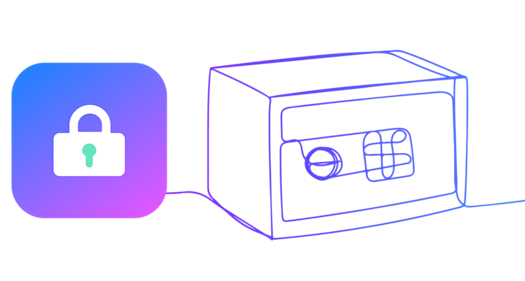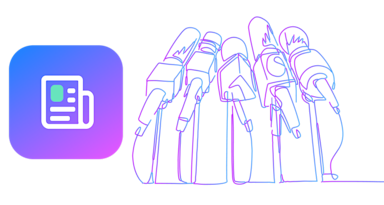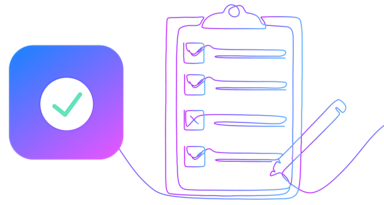New year, new you!
With the new year – and new decade – upon us, now is the perfect time to start thinking about what we want 2020 to look like.
For small business owners, or really any team member at a modern company, data privacy and information security present major challenges in the coming year. After an uptick in data breach incidents in 2019, we all need to be especially vigilant in the new year.
But data security issues don’t stay contained to our professional lives. The risk to our personal information and household privacy will also be high in 2020.
That’s why we’ve put together a list of data security resolutions to make in the new year, with new year’s resolution ideas that will help keep your sensitive data safe – both at home and in your professional life.
Ready to set goals and start 2020 off on the right foot?
New year’s resolutions for your personal life
To keep your personal life free from credit card fraud, ransomware attacks or other ways cybercriminals can victimize your household, the following list of new year’s resolutions will help keep your sensitive data safe.
Use MFA for all your accounts
While strong passwords can be difficult for bad actors to crack, relying on a password alone is the weakest way to prevent unauthorized users from gaining access to your accounts – particularly when password leaks happen like they recently did in India for Google Chrome users.
Multi-Factor Authentication (MFA) techniques, including randomly generated codes or biometrics like fingerprint scanners, add an additional layer of security and are available in various easy-to-use forms.
Getting started with MFA is incredibly simple to understand, making this one of the easiest new year’s resolutions to stick to.
Backup your files regularly
Much like the infamous catastrophe of Carrie Bradshaw neglecting to backup her files in one of the most memorable episodes of Sex and the City, leaving all of your files in one location (on your sole computer) can have disastrous consequences.
Backing up simply means that you are also saving everything in a different (often remote) location, ensuring that your files won’t disappear forever should anything happen to your device.
The most common methods of backing up include external USB drives, internet-based backup services, and cloud storage services that regularly perform automatic backups.
With so many possibilities, many of which are automatic, there’s no excuse to not perform frequent backups in the coming year – and you’ll be even more protected if you employ more than one backup technique.
Your future self will thank you.
Review and uninstall apps on your devices routinely
It’s always critical to only download applications on your devices that come from your operating system’s official app store and ensure they are from reliable publishers. After those bases are covered, however, it’s also important to do a regular “spring cleaning” of the applications on your devices.
Why? Well, sneaky cyberattacks can be embedded in apps that appear legitimate to the naked eye then spam you with ads – or worse. Even more troubling is that some of these malignant applications can remain on your devices after you delete the app’s icon, remaining unnoticed on your machine as either “semi-stealth” or “full-stealth.”
For the new year, it’s a good idea to regularly go through the applications you don’t use and uninstall them. Then, just to be sure, go through your app settings and make sure there is no trace of any unwanted apps.
Be extra skeptical of emails, especially ones with links
We already know that human negligence is the primary cause of company data breaches, but they can also be catastrophic for individuals and households. When it comes to cyber-attacks, phishing campaigns have become extremely sophisticated in recent years – and the coming year should be no exception.
To avoid falling victim to a phishing attack, the solution is simple: be very skeptical of emails you receive and, when possible, never click on links within an email.
Cybercriminals have become very skilled at making phishing emails look like legitimate communications from banks, government organizations, business partners, etc., and even the savviest among us can be easily fooled.
To protect yourself, avoid clicking on links within emails and go directly to – for example – your banking institution’s official site and login from there.
Stop using autofill for passwords when online shopping
Even though it’s wildly convenient, using autofill for your usernames and passwords with your browser or password manager can put you at increased risk of a cyberattack.
Cybercriminals can exploit autofill features by hiding a secret, hidden input field on a web page – which your browser or password manager would then fill in automatically and fly straight into the hands of a hacker.
Use a VPN
A Virtual Private Network (VPN) is a technique of routing your internet traffic through a remote network that hides your online activity from your actual internet provider (or whoever else gains access to your network).
Not only do VPNs establish a protected tunnel into which all your online traffic is channeled, it can also provide encryption so that any intercepted data wouldn’t be decipherable – so VPN users can do their online activities involving sensitive data with peace of mind.
High-quality VPN solutions are available for an affordable monthly rate and can save you thousands of dollars down the road by making sure that all your online activity is secure and remains obfuscated from anyone who wants to take a peek.

Business resolutions for data security
While keeping your personal life free from data security disasters in the new year is vital, it’s also incredibly important for us to carry these new year’s resolutions into our professional lives – to strike a work-life balance that minimizes data privacy risk on both fronts.
This is especially true for security professionals or small business owners who handle their customers’ sensitive data in any way, shape or form, but professionals from all industries would be wise to implement the following new year’s resolutions to minimize their cybersecurity challenges.
Control who gets access to your business’ data
Maintaining total control over who has access to which types of sensitive data is critical to ensuring that sensitive personal information stays in the right hands. With role-based access control (RBAC), making sure this happens is simple.
RBAC designates access to employees whose roles make it necessary to handle certain types of sensitive data, ensuring that unnecessary team members don’t touch any data they don’t need to access for their responsibilities.
This method of access control is especially important for companies that have a high number of employees, or organizations that work with contractors or third parties.
Employee education
On a day-to-day basis, your company’s employees are usually the largest source of vulnerabilities when it comes to data security – and it’s not just your security team.
That’s why making sure that every employee on each team within your organization is on the same page when it comes to your information security practices and policies is essential.
According to a survey by Wombat Security Technologies, over 30% of employees who participated in the study did not know what malware or phishing was, so a baseline level of knowledge needs to be established – and every employee needs to be given clear and easy-to-navigate instructions on how to handle a suspected phishing email or malware attack.
Not only will this help you achieve your business goals for data privacy in 2020, your employees will also likely bring the cybersecurity lessons they learned at work home with them and start protecting their own sensitive dataas well.
Data backup and recovery
It’s not just photos and important personal documents that need to be safeguarded using backups. Your customers’ personal information and any business-critical data also needs to be backed up.
No matter how large your organization is, it’s probably the case that user data is a key aspect of your normal operations. And, since it’s a safe assumption to say that all computer systems crash eventually, it’s vital to be prepared for anything that comes your business’ way.
From cyberattacks to accidental error and even floods or spilled coffee, anything can happen – so having more than one type of backup is essential to protect your company from any loss of business-critical data.
H3: Update all operating systems and install patches routinely
This one is a hugely important security measure, as software publishers often fix bugs and vulnerabilities when they release a new version of their operating system.
Updating operating systems and installing patches helps to reduce the potential of malware attacks and other potential threats, plus comes with the added benefit of running the latest, smoothest version of whichever platform you’re using.
Make it easy for your users to keep their data secure
Your customers shouldn’t need to look very hard to find your business’ mission and values when it comes to their privacy, and your company’s data security compliance certificates should be clearly displayed.
Additionally, providing your website’s visitors with an easy-to-access opt-out option for collecting certain types of sensitive data can help bolster customer trust in your brand and put your dedication to data privacy in focus.

Making changes for a secure 2020
Whether it’s rethinking how you approach information security at work or reshuffling your data privacy strategy for your household, the new year is a great opportunity to wipe the slate clean.
By considering making the above new year’s resolutions and reassessing how you protect sensitive data both at your organization and in your personal life, 2020 can be a year characterized by growth and security – not data privacy risk.
Taking the necessary steps to secure your household’s sensitive data is mostly in your hands, but moving to safeguard the sensitive data that passes through your company’s databases can be effortless with a little bit of help.

VGS’ innovative data privacy solutions take data breach worries off your business’ plate, as we ensure that all sensitive data is protected from collection to storage and transfer. Using its unique data aliasing technology, VGS makes sure that sensitive information always stays in the right hands.
Try a demo of VGS’ solutions here.




